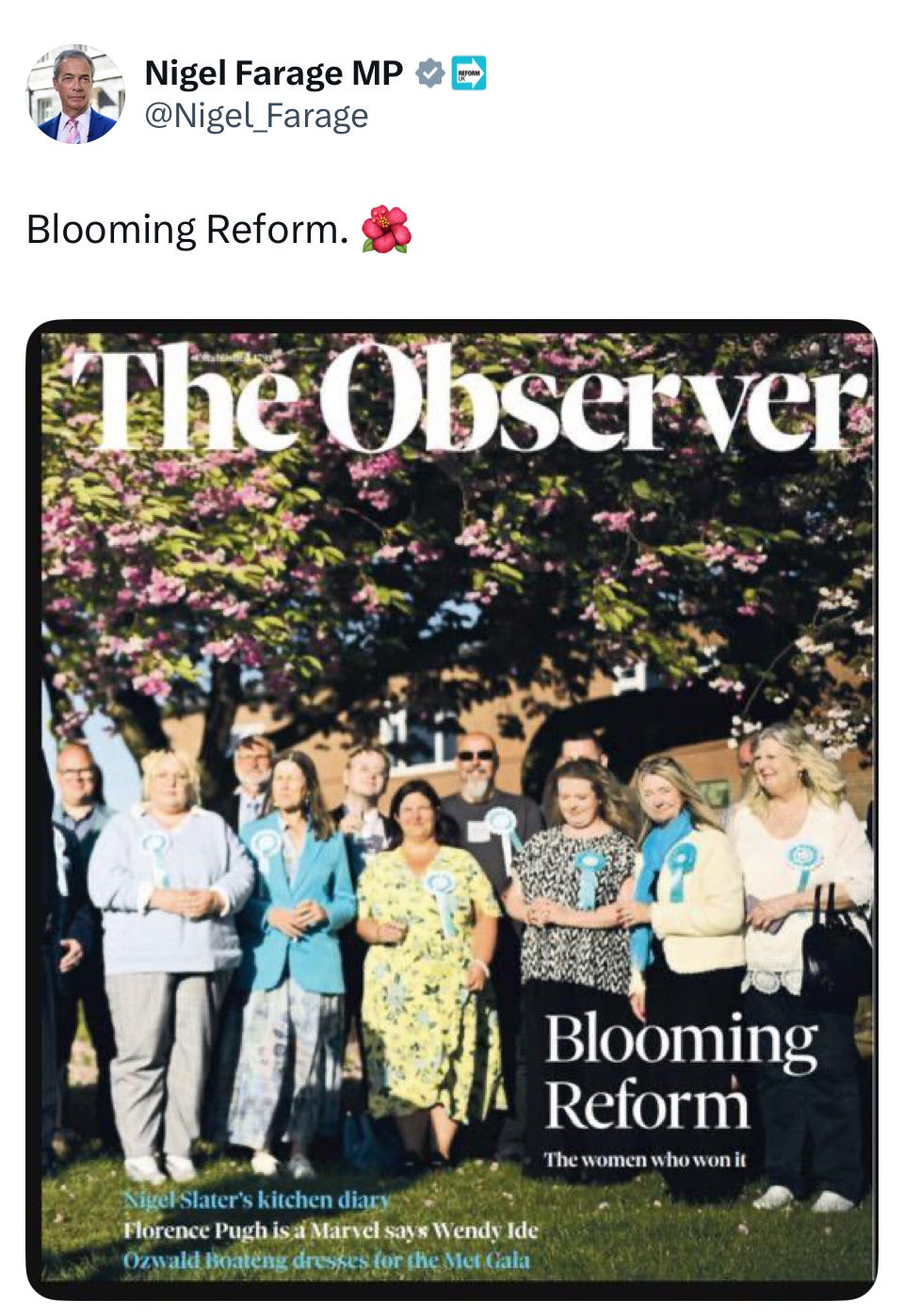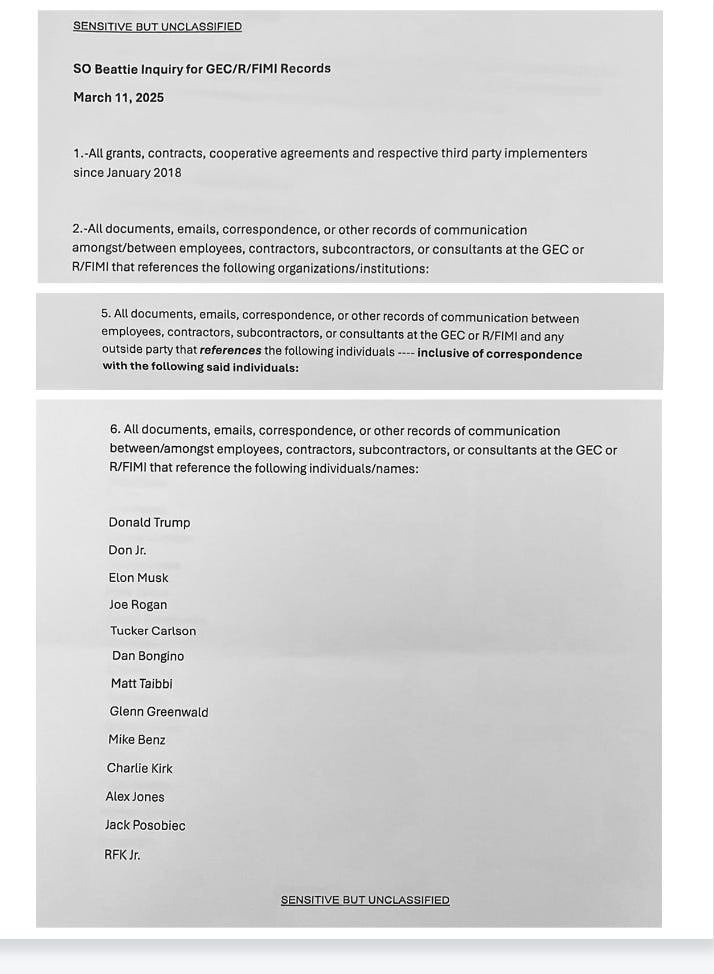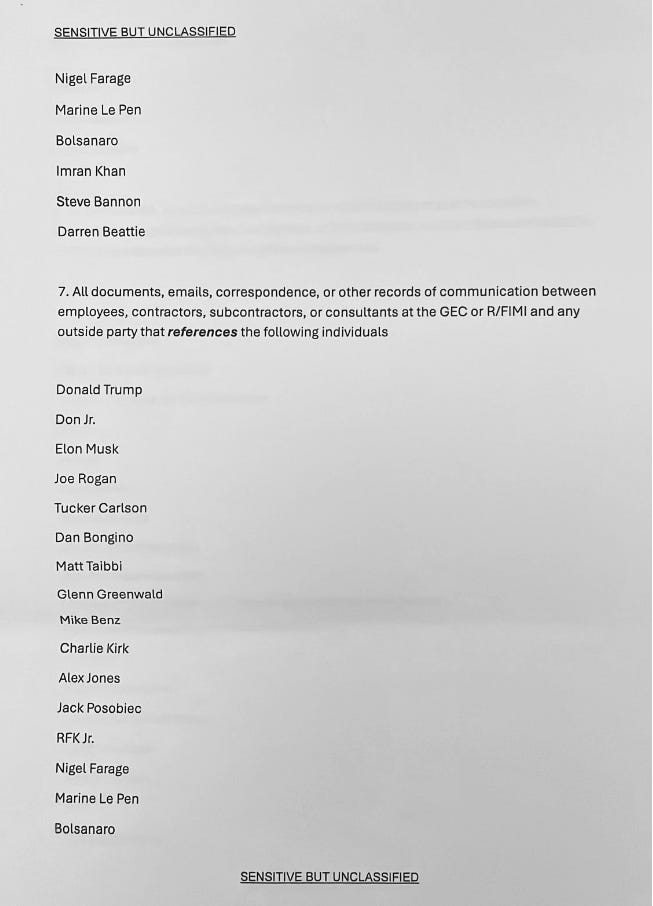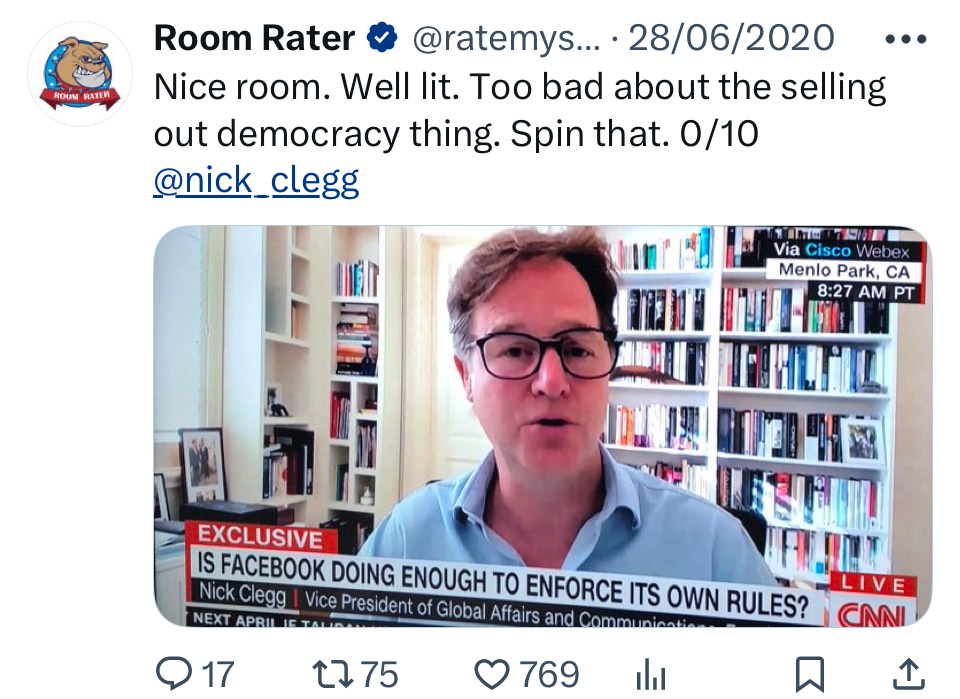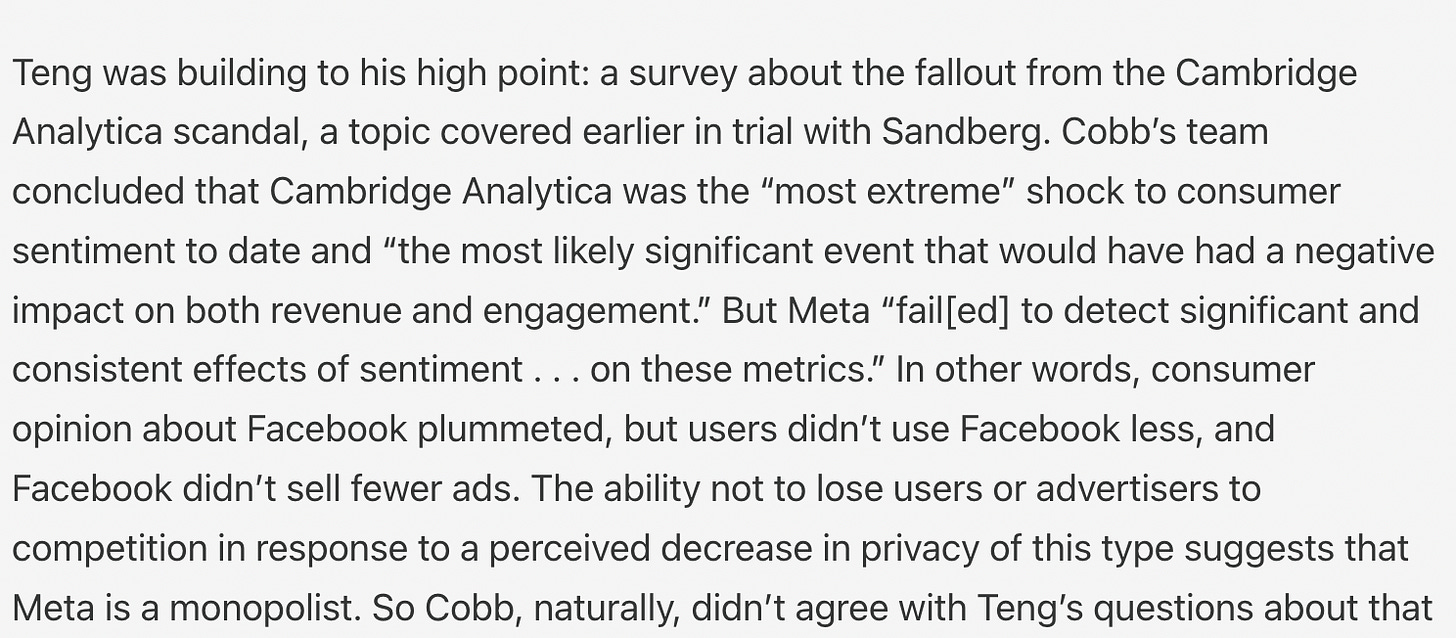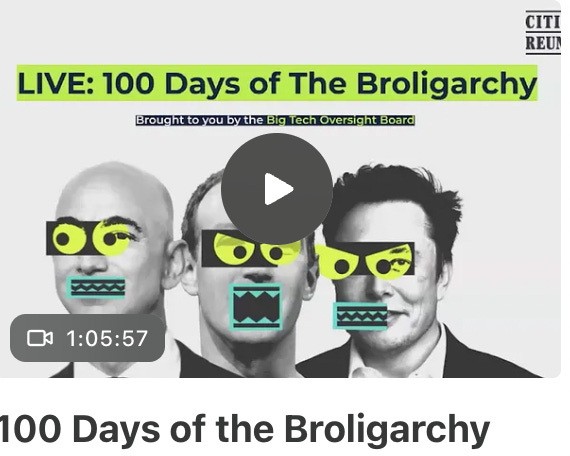A note on what I’m doing and why. I’m an investigative journalist who worked for the Guardian for 20 years latterly investigating the intersection of politics and technology that included 2018’s exposé of the Cambridge Analytica/Facebook scandal. The opaque and unaccountable Silicon Valley companies that facilitated both Brexit and Trump are now key players in an accelerating global axis of autocracy. I believe this is a new form and type of power: Broligarchy.
This is Nigel Farage, friend and ally of Donald Trump, and leader of Britain’s far-right political party, Reform. A party that has been been endlessly championed by Elon Musk. And this is Nigel Farage’s Twitter feed today. He’s celebrating the front page coverage and positive reinforcement of his party by the newspaper that until two weeks ago was owned by the Guardian and is where I used to work.
This is what normalisation looks like. It’s how far-right parties across the world game the media attention cycle. And how the press plays right into their hands. Remember the 2017 magazine pieces about the new sharpsuited ‘alt right’? The hipsters reinventing racism? This feels like that all over again.
There’s not any one factor that led to Trump’s tumultuous second term in the US. It took years and hundreds of thousands of microsteps. But Farage has repeatedly aligned himself with Trump and since Trump began busting through constitutional norms and laws, Farage hasn’t resiled that support or distanced himself. In fact, he’s done the opposite. He’s now actively employing the language of Elon Musk’s DOGE in his political speeches.
There can be no mistaking who he is and where this is heading and yet the failure to even recognise that, let alone understand it or stand against it, is on us. Whatever mistakes were made in the past (the BBC endlessly booking Farage for the clickbait hits), we have to now recognise that we are in a wholly different time. Normalising Farage is to normalise Trump. And choosing to cosify his party with this Calendar Girls-style treatment (the Brit flick about middle class Women’s Institute members posing for a nude girlie calendar) is to make his success seem inevitable.
It hits hard this week, not just because we’ve seen Trump pass the 100 days mark and been exposed to multiple reminders of his most cruel and egregious acts but because here in Europe, we’re celebrating the 80th anniversary of VE Day, Victory in Europe, the day the Allies formally accepted Germany’s unconditional surrender.
Because amid the noise of this week’s news cycle, there was one story this week that chilled me more than any other and is worth spelling out here: the decision by the domestic German intelligence service’s to label the AfD an extremist group.
This was not a decision that was undertaken in any way lightly. The Alternativ Für Deutschland is, according to some polls, the most popular party in the country. And in Germany, as anywhere else, there is natural – and justified – nervousness about state interference in anything or anyone involved in politics.
But as the New York Times reports, the intelligence agency only made the decision after the publication of a 1,100-page report compiled by the Office for the Protection of the Constitution.
The office was specifically created in 1950 to monitor domestic threats to Germany’s democracy and prevent any takeover of Parliament and government by extremist actors. It was an attempt by modern Germany’s founders to prevent the kind of takeover that took place in 1933, when the Nazis seized control of Parliament and government in short order.
And the outgoing interior minister, Nancy Faeser, put out a statement saying the AfD’s policies are in contravention of the German constitution:
“The AfD advocates an ethnic concept of the people that discriminates against entire population groups and treats citizens with a migrant background as second-class Germans.”
Germany has some of the strongest constitutional protections in the world. It, above anywhere else, understands the risks to the rule of law – and humanity – of a determined, malevolent individual who would use the democratic protections of a free society to undermine it from within and carefully set up controls – such as the Office to Protect the Constitution – to prevent it from ever happening again.
I read that article on a beautiful spring day in a London park bursting with blossomy loveliness. And it brought home the cognitive dissonance, the normalcy bias, the huge and gaping gap between what is happening in the world right now and our day-to-day inability to understand it, let alone prevent it.
The richest and most powerful country in Europe appears helpless to protect itself from a global far-right movement that is growing more powerful every single day. A global far-right movement that has received a huge shot in the arm from the ascendancy of one of its own to the White House and that operates via an instantaneous transnational communication network that feeds and reinforces it.
It was only a matter of moments before the owner of that network made his own commentary on the decision:
This reverse attack approach is what it makes it so incredibly difficult to fight back against the far right. They have captured the language of defenders of democracy defenders and reversed the meanings of these terms.
Musk isn’t the only champion of the AfD. The Secretary of State, Marc Rubio, came out with a fighting defence of the party calling the German government “tyranny in disguise”. As did Vice President JD Vance.
But Musk has led the way. German far-right politics is one of his hobby horses alongside Putin’s designs on Ukraine, Nigel Farage’s Reform party in the UK, and white farmers in South Africa.
Two weeks ago, I had the opportunity to ask a close friend of Musk’s why. What was it the first attracted Elon Musk to the successor of the Nazi party? The encounter was at TED, the world’s leading technology conference, that I spoke at three weeks ago.
At the time, I wrote about the “waves of hostility” coming off a certain section of the audience as my talk went on. A few days later, I got to meet someone from that section of the audience: a close friend of Musk’s married to a VC investor who sits on the board of two of Musk’s companies.
It was a fascinating encounter, orchestrated by an eminent psychedelics researcher – Silicon Valley is ground zero of early adopters, a not insignificant slice of whom embraced psychedelics some years ago. He asked this woman if she’d be interested in talking to me.
In the end, there was a small group of us who gathered around as she explained that Musk is an “awkward” individual who makes “jerky” hand and arm gestures. He’s not an anti-semite, she explained, so there’s no way that arm gesture was a Nazi salute.
But then why, if that was the case, did he repeatedly cheerlead his support for the far right AfD? “I don’t know,” she said honestly. He was a dear friend, she said, a goodhearted person, who was working for the US government for free who was doing hugely valuable work saving millions by detecting fraud, waste and abuse and you couldn’t believe what you read in the newspapers.
One person in the group challenged her about the swingeing cuts to the USAID. His daughter worked in an allied field and had seen how devastating those cuts were up close. Another, a paediatrician, questioned her on the savage cuts to cancer research by his attacks on the National Institute for Health. But what this woman kept repeating was that you couldn’t believe what you read in the newspapers and you especially couldn’t trust the New York Times.
This was a highly educated, intelligent woman whose progress through life had presumably been helped by her ability to understand and analyse facts who was now wilfully in denial about any that might disturb her view of Elon, the good guy. Or that, perhaps, impinged on her husband’s business interests.
I was actually grateful for her willingness to talk. Understanding the arguments from the other side is key. But I’ve been thinking about her words intermittently ever since. She objected to opinion pieces she’d read in the Times so refused now to read their news. She got her information from “specific sources I trust”.
The assumption that newspapers work off – that people should trust them, that there’s a robust replicable process used to establish facts and report them – just doesn’t hold water with half the population now. That is the challenge for anyone working in the media right now.
A new political witch hunt takes off
One of the unmissable voices on Substack, Anne Applebaum, wrote yesterday about she’s on a hitlist of people who’ve been targeted by the US State Department. She quotes a piece that dropped two days ago from Ellen Guo at MIT Technology Review that reveals a Trump appointee has sought communications between journalists and the Global Engagement Center, a US government body set up to track and counter foreign disinformation campaigns.
It is, one official said, “a witch hunt…that could put the privacy and security of numerous individuals and organizations at risk.”
It was World Press Freedom on Friday and it’s worth registering how fast that freedom is disintegrating in America. This is an enemies list. And journalists, here, are being framed as such. There is already a playbook for how this will pan out. The email communications and other records will be selectively released to pet journalists to frame normal journalistic practices as malign intention, exactly what Elon Musk did when he acquired Twitter.
This isn’t exactly a secret. The official has actually semaphored his intention to half the department.
[Darren] Beattie, whom Trump appointed in February to be the acting undersecretary for public diplomacy, told State Department officials that his goal in seeking these records was a “Twitter files”-like release of internal State Department documents “to rebuild trust with the American public,” according to a State Department employee who heard the remarks.
And, here, again, reinforcing the transnational nature of what is happening is….one Nigel Farage. Someone in the Trump administration is seeking a propaganda boost for the UK political leader. But who? And why?
This is what normalisation looks like
Silicon Valley executives are collaborators. They are complicit in a regime of cruelty and fear. That is the whole message of my TED talk three weeks ago and why I walked back into the ring of fire to deliver it, in person, to them directly.
They have made a choice. And these men continue to make that choice, every day, in which they chum up to Donald Trump and profit from the wrecking ball he is taking to the US constitution.
Six years ago, in the throes of Facebook’s biggest ever scandal, the leadership began a search for someone to go out and bat for them in the press and with policymakers. They needed someone plausible, with experience at the highest levels of government who would be willing to overlook the morally indefensible aspects of its business.
They landed on one man: the former UK deputy prime minister, Nick Clegg. A politician who sold out his party in order to get into bed with a Conservative prime minister, wave through a programme of devastating austerity and facilitate an in-out vote on the future of the European Union.
Clegg was the front man to be wheeled out to claim it was “ludicrous” Facebook had anything to do with the January 6 insurrection. ( An investigation by ProPublica and the Washington Post found at least 650,000 posts on Facebook groups spreading lies and calling for violence).
In exchange, he re-shaped himself as a Silicon Valley powerbroker and, according to the Times, pocketed $100m in compensation.
And now, the reputation launderer-in-chief, is being reputation laundered…by the paper which broke the scandal that led to Facebook employing him in the first place. The Observer gave Clegg three pages in its launch edition last week.
I had no desire to write about the Observer’s new management. And there’s a tradition in UK journalism to not criticise other media outlets. It’s what enables a chumocracy to operate at the highest levels of politics and the media. Both are dominated by a narrow class of men educated at expensive private schools who scratch each others’ backs.
And, no good has ever come from getting on the wrong side of them. I’m now a warning parable of what happens when you speak up. But silence is complicity. And I refuse to allow Nick Clegg to be whitewashed. He was literally employed to try and repair and cover up the damage that the journalistic work my colleagues and I did to Facebook’s brand. Damage that Facebook brought on itself by its own actions. Damage that we hoped would bring some sort of accountability to a multi-billion dollar global company that appeared to operate above the law.
It was Clegg who helped prevent that from happening. Though the fight is not over. Right now, these Silicon Valley companies are fighting a rearguard action against some heavyweight lawsuits that are aiming to break them up. In the US, Meta is facing off against the Federal Trade Commission in a major long-awaited trial. A Washington DC court is hearing arguments about whether then-Facebook illegally monopolized the market for “personal social networking services” through its acquisitions of Instagram and WhatsApp.
There was a pretty extraordinary report this week from the courtroom. I’ve failed to follow it closely until now but there’s an entire Substack devoted to it and this week the Cambridge Analytica scandal was cited by federal investigators as a central argument that they claim proves that Meta is a monopolist.
Citizens Reunited
Since 2020, I’ve been in a Signal group of leading tech activists who came together to put pressure on Facebook to deplatform hate, threats of violence and lies ahead of the US election. When Clegg was pushed out of Facebook announced his resignation earlier this year, we’d been speculating about where he’d end up. He hasn’t spilled any beans on Facebook. He’s just taken millions of dollars and signed an NDA. In no circumstances, should his be a voice we are listening to. He has zero credibility.
Who we should be listening to are the likes of Roger McNamee, a Silicon VC who’s become one of its fiercest critics, Yael Eisenstat, a Facebook insider who resigned, refused to sign an NDA, and who’s been publicly and repeatedly critical of its leadership, Jessica Gonzalez, the head of Free Press, an NGO that champions all aspects of media freedom and Zamaan Qureshi, an amazing youth tech advocate.
They are some of the people in that same Signal group and this week, I hosted a conversation with them, organised by the Citizens, “100 Days of the Broligarchy”:f
The papers have been full of reflections on the first 100 days of Trump’s presidency but it was fascinating for me to zone in on the tech aspects of what’s happening and talk to them about what they found most troubling.
This was hosted on a new Substack channel and newsletter, Citizens Reunited. Do consider following it to hear more from these experts and to nominate other people you’d like to hear from. It’s an initiative from the Citizens, a non-profit seeking to hold Silicon Valley companies to account. It runs most of its activities including its newsletter, the Citizens Dispatch, from Ghost which is widely seen as the ethical alternative to Substack.
But they’ve joined me over here on Substack too because there’s no doubt there is a growing audience here. Substack, has the familiar problems of other VC-funded platforms, but it has also become a thriving hub for independent journalism. And I believe we need to build media networks not empires and collaborating with properly independent voices is how we build a new information ecosystem free from billionaire influence.
Here’s a bracing clip of the always refreshing Roger McNamee. He’s the man who introed Mark Zuckerberg to Sheryl Sandberg and I cannot underline enough why he, not Clegg, is who you should be listening to.
Also on Citizens Reunited, is a Substack Live that I did this week with Peter Jukes, the executive editor of Byline Times, and Sergei Cristo, the Conservative party insider who blew the whistle on Kremlin interference at the highest levels of the UK government and the star of our number one hit Sergei & the Westminster Spy Ring podcast.
We’re hosting a live event in London on May 14 if you’re based there. (If you’re not, worry not, we will be doing more events, talks and Substack Lives online.)
That’s all for now. Do check out the new Citizens Reunited newsletter and leave any suggestions you have for what else we should be doing there. Sources of funding for any non-profit work involving trying to hold Silicon Valley companies to account is rapidly drying up so to continue this work we need to build a community of people who care.
PS, Here, because it should never be forgotten, is Nick Clegg shilling for Mark Zuckerberg’s multi-billion dollar multi-ridiculous failure, the Metaverse. Enjoy.
This post has been syndicated from How to Survive the Broligarchy, where it was published under this address.

